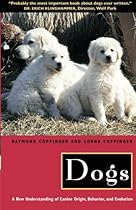Dogs: A New Understanding of Canine Origin, Behavior and Evolution

| Author | : | |
| Rating | : | 4.81 (869 Votes) |
| Asin | : | 0226115631 |
| Format Type | : | paperback |
| Number of Pages | : | 352 Pages |
| Publish Date | : | 2016-04-08 |
| Language | : | English |
DESCRIPTION:
Richard W. For thousands of years after dogs stopped being wolves, and before they became pets, they were something else -- a self-domesticated species with a mind of their own. "Dogs" teaches old dog lovers new tricks. Wrangham professor of anthropology, Harvard University Forget being the alphawolf. The Coppingers' convincing new theory of dog evolution will be as interesting for archaeologists as for breeders and pet owners. . Dr
"Five Stars" according to Zofia. Good book. G. Glass said Every dog owner should read this book!. This is not a training book, but readers will gain much insight into the dogs they are training from it. It is an excellent and very readable book on the origin and behaviors of the domestic dog and its wild Canid relatives. There is an excellent analysis of how some of the service dog programs could be vastly improved by using current knowledge of critical learning periods in the young dog. Also of great interest is a discussion of the damage do. Bukkene Bruse said Good in its main parts. The Coppingers in "Dogs" try to say a few different things. The main topics are how wolves became selected as dogs, what this implies for their behavior and training, and the ethics of pure-breeding and using working dogs as pets. In these core topics, this book is generally well argued and supported in the main, but suffers from hiccups of poor reasoning. In one example, when arguing why bigger dogs are better for the transhumance, the authors s
Tracing the evolution of today's breeds from these village dogs, the Coppingers show how characteristic shapes and behaviors—from pointing and baying to the sleek shapes of running dogs—arise from both genetic heritage and the environments in which pups are raised.For both dogs and humans to get the most out of each other, we need to understand and adapt to the biological needs and dispositions of our canine companions, just as they have to ours.. Biologists, breeders and trainers, and champion sled dog racers, Raymond and Lorna Coppinger have more than four decades of experience with literally thousands of dogs. They argue that dogs did not evolve directly from wolves, nor were they trained by early humans; instead they domesticated themselves to exploit a new ecological niche: Mesolithic village dumps. Offering a scientifically informed perspective on canines and their relations with humans, the Coppingers take a close look at eight different types of dogs—household, village, livestock guarding, herdi
